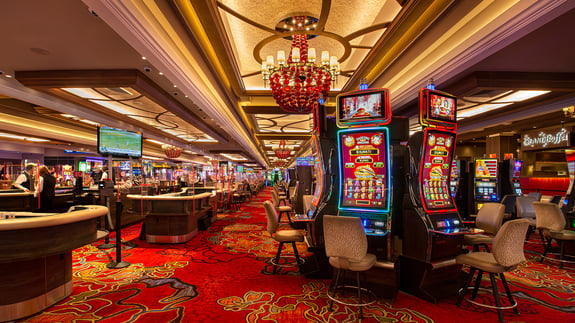
Gambling games have long been a staple in human culture, delivering not just entertainment but a intriguing reflection of our hopes, dreams, and fears. From the spinning reels of a slot machine to the tactical play of poker, these games embody a spectrum of human feelings and experiences. At their core, casino games are not just a chance to win money; they are a microcosm of life itself, where risk and reward converge and fortunes can change in an eye blink.
As players assemble around tables or sit in front of brightly lit machines, they participate in a ceremony that transcends mere gambling. These games reflect our instinctive desires for relationships, adventure, and the search for fortune. They also reveal deeper truths about human nature, such as our relationship with fate and the thrill of uncertainty. In exploring casino games, we reveal not only the rules of play but also the intricate pattern of the human journey, showcasing our intertwining narratives of aspiration and reality.
The Psychology of Gambling
Gambling is deeply rooted in the psyche of individuals, tapping into various emotions and desires. The excitement of taking risks is a fundamental aspect that attracts participants, be it it’s excitement of spinning a roulette wheel or the anticipation of drawing a winning hand in a poker game. This adrenaline is frequently likened to other forms of excitement, as the unpredictability of outcomes elicits a distinct psychological response. Players often find themselves entranced by the chance of winning big, leading to an irresistible draw toward casino games.
Another, a crucial component of the psychology behind gambling is the concept of hope and ambition. Participants often indulge in dreams of financial freedom and the opulent lifestyle that can accompany winning. This hope fuels their ongoing participation in casino games, as it provides a sense of meaning and the conviction that a life-changing win could be just one wager away. The story of beating the odds and achieving success resonates with many, reinforcing their commitment to play and engage with these games.
Finally, social aspects play a significant role in gambling psychology. Gambling venues are designed to promote social interaction, where players gather to share the experience of wins and losses. This shared aspect not only amplifies enjoyment but also affects behavior, as individuals often mimic the actions of others in their vicinity. The collective approval found in mutual thrill can enhance the emotional experience, making casino games a mirror of not just personal desires but also collective engagement within the gambling community.
### Risk and Reward: A Double-Edged Sword
Casino games embody the fragile balance between danger and reward that resonates deeply with the human experience. The thrill of placing a bet is often accompanied by a jolt of energy, as gamblers are confronted with the prospect of winning big, yet fully aware of the possibility to suffer losses. This bipartisan experience reflects a essential aspect of life: the paths we choose often come with inherent risks, and the pursuit of reward can compel us to take chances we might not normally consider. In this way, casino games mirror real-world choices, enticing players to risk not just their capital, but also their aspirations.
The allure of big prizes and payouts fuels a wave of hope, inspiring players to envision a better future that could manifest from a single victorious spin of the wheel or flip of a card. This optimism can motivate individuals to engage in riskier behaviors, pushing them to take greater risks in search of monetary success. However, just as in life, the outcomes of these risks can lead to both victory and failure. The narratives of both jackpot winners and those who have lost everything at the casino demonstrate the random nature of luck and its consequential impact on our lives.
Ultimately, the interaction of engaging with casino games serves as a potent reminder of the nature of humanity. sportwetten ohne OASIS Every game played is loaded with the tension of uncertainty, as players weigh the rewards against the dangers. This balance not only highlights the thrill that comes with gambling but also unveils the vulnerabilities that come with the urge for more. As we journey through the challenges of choice and consequence in both the gambling world and in life, we find that the quest for gain shapes our character and lives in profound ways.
Society and Loneliness in Casino Culture
Casino environment is a special blend of communal interaction and personal endeavor, reflecting the tensions of individual experience. Players often come together around games, experiencing in the thrill of the action, celebrating wins, and sympathizing over losses. This communal aspect is vital, as it establishes a sense of belonging and camaraderie among varied groups of individuals. Regular attendees to gaming establishments may build friendships and develop routines, turning the casino into a second home where they experience connected to a larger community of gamblers.
However, the allure of casino activities can also result to loneliness. As players become immersed in the excitement of gambling, they may withdraw from personal relationships or neglect to engage with the world outside the casino. For some, the search of a windfall can distract from real connections, leading to isolation. The experience of being among people yet feeling solitary is not rare, as the attention shifts from collective fun to the individual stakes of each individual’s journey.
This interplay of community and isolation creates a rich tapestry that defines gaming atmosphere. It showcases the intricacy of human interactions, where joy and sorrow exist together. Casinos serve as both a sanctuary for social engagement and a platform for individual struggles, illustrating how intimately connected our desire for connection and the individual quest for fortune can be. In navigating this landscape, gamblers confront their own narratives—seeking both the rush of the wager and the companionship of fellow gamblers, eventually reflecting the wider spectrum of human experience.
